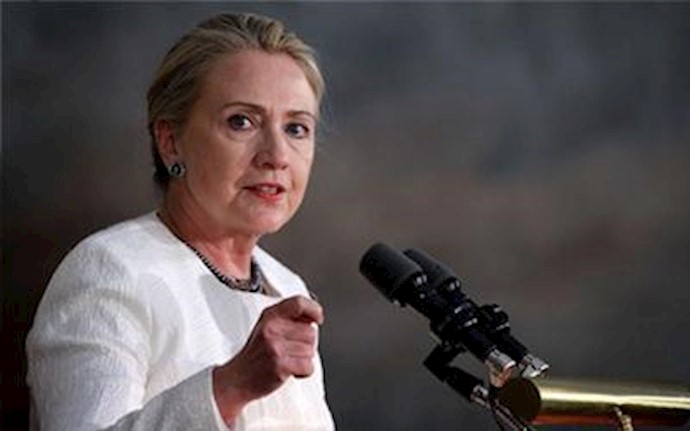By Former U.S. special envoy Lincoln P. Bloomfield Jr.
The Hill, 23 Oct 2012 – Secretary of State Clinton has removed the Mujahedin-e Khalq (MEK) from the US list of Foreign Terrorist Organizations (FTO), fifteen years after Secretary Madeleine Albright first listed the group. Administration officials have explained that this is not a signal of political support for the MEK against the regime in Tehran, merely an acknowledgement that there is no factual or legal justification for keeping the group on the list.
This decision required political courage, as it was certain to displease the Iranian fundamentalist regime with whom a negotiated end to the nuclear standoff is sought, and coming soon before the US elections. Had she not acted the U.S. Court of Appeals for the District of Columbia Circuit would have removed the MEK from the terrorism list on October 1. Secretary Clinton’s initiative to act first and de-list was right for several reasons.
First, along with her recent move to list the Haqqani Network as a FTO, the MEK de-listing bolsters the credibility of U.S. counterterrorism policy. While the choice whether or not to list a foreign group reflects a calculation of national interest, the Haqqani and MEK actions are now both aligned with intelligence dossiers reflecting the existence or absence, respectively, of international terrorism that threatens US interests.
Second, over 3,000 MEK members and supporters who have been moved out of a town in Iraq called Camp Ashraf, where they lived for the past 25 years, are still inside Iraq and must find other countries who will accept them as refugees. Knowing that U.S. law enforcement and counterintelligence agencies will no longer be tasked with tracking the travels, communications and transactions of these people as terrorists should make it easier for many governments – possibly including our own – to accept a share of MEK refugees.
Third, had the Administration left it to the federal Appeals Court to de-list the MEK, critics would have claimed that the de-listing was based on a narrow legal interpretation of the governing 2004 law and that the group still merited FTO listing on foreign policy grounds. Secretary Clinton’s action confirmed that the government lacked evidence to justify re-listing the MEK. Congress would do well to revisit the 2004 law and consider restoring full discretion to the executive branch, with a requirement that all FTO designations expire after a reasonable review period absent re-listing by the Secretary of State.
Taking the MEK off the terrorist list will not relieve the Administration of further burdens. Iraq’s Prime Minister Nouri Al-Maliki has made clear that this population is unwelcome in Iraq, yet they are still at a base in Baghdad formerly called Camp Liberty. While Mr. Maliki has previously cited the US terror designation in justifying Iraq’s own treatment of the MEK as terrorists, he has already said the US de-listing will have no effect on Iraq’s stance.
Iraq has issued charges against nearly 200 ‘leaders’ of the MEK at Camp Liberty, yet the latter are denied access to lawyers or any due process, according to Tahar Boumedra. He was the UN official in charge of the relocation process from Camp Ashraf to Camp Liberty until his resignation earlier this year to protest the UN mission’s concealment of Iraqi violations of human rights and humanitarian standards for these people. The UN cannot accord refugee status to a person facing criminal charges.
Mr. Boumedra recently testified to Congress that Iraq’s ill treatment of the MEK population reflects a declared policy to make their lives “unbearable.” Prime Minister Maliki’s office, he said, is acting in full coordination with the Iranian government, whose embassy in Baghdad hosted several meetings with Iraqi officials and the UN mission this year to plan the movements of MEK personnel out of Camp Ashraf. Iran clearly does not share the US goal of resettling over 3,000 regime opponents safely in third countries.
This population now sits in a 0.6 square kilometer encampment ringed by tall concrete barriers and seven access checkpoints. Security forces at Camp Liberty are commanded by an Iraqi officer, Colonel Sadiq Mohammed Kazem, who led the Iraqi military unit that massacred defenseless MEK residents at Camp Ashraf in April 2011 – an attack which, along with the July 2009 attack by Iraqi forces, left 49 killed and several hundred wounded. As a gross violator of human rights, Colonel Sadiq would be banned under US law from ever receiving US military training.
Why the United States pushed a plan that placed the exile population under the ‘protection’ of this officer is a question Secretary Clinton should hope never to face. Former UN official Boumedra has pointed out that the US obligation to protect these people – embodied in individual contracts signed by U.S. forces in 2003 after disarming and investigating each one – remains in force under the Fourth Geneva Convention because Iraq has not upheld its commitment, obtained by departing U.S. commanders, to protect them.
Secretary Clinton has urgent business to complete, to ensure that Iran, with the help of the Iraqi Prime Minister’s office, does not succeed in overriding U.S. policy, UN protocols and a U.S. promise to protect MEK personnel still in Iraq. She should lean on friendly governments to accept these exiles and ensure that, whatever U.S. opinions may be about the MEK, its future is determined on Washington’s terms, not Tehran’s.
The author, a former U.S. Special Envoy, was Assistant Secretary of State for Political Military Affairs from 2001-2005








